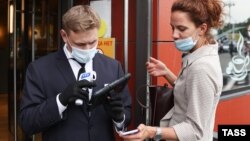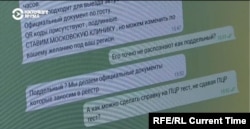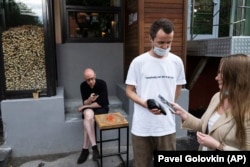As Moscow’s COVID-19 restrictions steadily increase, so, too, do the counterfeit documents used to get around them. Now, aside from fake COVID-19 vaccination certificates, fake QR codes, obtainable on the messaging app Telegram, have become a hot market.
As of June 28, entrance into Moscow’s restaurants, bars, cafes, and large public events requires an official QR code that confirms a completed vaccination with a Russian vaccine, a negative COVID-19 test result within the past three days, or a COVID-19 infection within the past six months.
Currently, more than 2.5 million people within the Russian capital, roughly 21 percent of its population, have these codes, according to officials.
Public transportation and stores may soon also join this list of “COVID-free” establishments, the municipal official overseeing trade and services, Aleksei Nemeryuk, told the state-run TV station Channel One on June 29.
Less than a week earlier, Nemeryuk had denied such a prospect, but Russia’s COVID-19 crisis apparently prompted a change in strategy.
Moscow, a city of some 12 million people, contains Russia’s highest daily infection and death rates (5,823 and 117 cases, respectively, as of June 30, 2021) for COVID-19. On June 28, a record of 124 deaths was set.
Mayor Sergei Sobyanin has blamed that trend on the virus’ more contagious form, known as Delta, first detected in India. Sobyanin sees the QR codes as a first line of defense against this variant; if they fail, he warns, citywide, obligatory vaccination or a lockdown could go into effect.
But not all Muscovites agree that vaccination – as in other regions, now obligatory for the majority of employees in certain professions – is the way to stop the pandemic’s spread.
Within the past few days, IT specialists have identified 29 new domain names that imitate the look of the official Gosuslugi (State Services) site, which records legal QR codes in conjunction with the Moscow city government’s portal.
Dozens of channels on the messaging app Telegram now offer these codes as well as vaccination and COVID-19 test certificates, and proof of antibodies.
Contacted by Current Time, the representative of one such channel stated that the price for each QR code or certificate is 6,100 rubles ($83.58).
The certificates can be attributed to the region of a customer’s choice, the representative wrote on Telegram. The channel also offers these materials in English as well as Russian.
The individual apparently sees these transactions as ordinary business. Asked if the codes will not be recognized as counterfeit, the individual replied, “Counterfeit? We’re making official documents that we enter into the [state] registry.”
Most likely, these codes are entered into one of the sites imitating the official Gosuslugi (State Services) site that records QR codes.
Code fraudsters simply set up a website with a design that will resemble that of Gosuslugi, commented Aleksei Drozd, head of information security for SearchInform, which develops various risk-management software for businesses.
Untrained servers checking QR codes outside Moscow’s restaurants and cafés are unlikely to detect the differences between fake and genuine codes.
“In the end, the human factor comes into play,” Drozd said. “Who can be vigilant? Only the server. But since he can be tired and [verifying QR codes] is not his direct responsibility, we can see this kind of fraud.”
Creating a smartphone or tablet application for a more minute inspection of QR codes would only require several days, commented Drozd. The app could verify any relevant link to the site where the code is recorded, and, if, to a legitimate government site, confirm that the presented QR code actually exists there, he added.
The authorities have not yet specified how servers should respond if they detect a fake QR code.
The phenomenon is not new, however: An executive at Moscow digital-security firm Bi.Zone, Yevgenia Voloshina, told RIA Novosti that such codes have been for sale since May in darknet forums for an average of 11,000 rubles ($150.39) per item.
The Kremlin does not conceal its alarm about “various crooks” placing “people’s health at risk” to meet the demand in this “niche” market.
“Without a doubt, measures are needed to fight with these crooks,” observed presidential spokesman Dmitry Peskov on June 29.
But no such national measures have been tabled yet.
Indeed, although Peskov referred to the fake QR codes as counterfeit documents, not all lawyers are confident that the Criminal Code’s punishments for counterfeiting documents would apply here.
While Russia’s COVID restrictions are grounded in federal law, the heads of regions set the actual restrictions by decree, noted lawyer Leonid Abgadzava, an expert for the prisoner-rights organization Russia Behind Bars. As such, fake QR codes do not, in theory, violate a specific federal law, Abgadzhava commented.
Moscow Mayor Sergei Sobyanin supported QR codes as “the most reliable and optimal” way to avoid the fake paper certificates that “all these crooks” are offering for sale online, he told the TV channel Vesti (News) on June 26. He does not appear to have yet addressed the appearance of fake QR codes.
One senator in the Federation Council, the upper chamber of Russia’s bi-cameral parliament, asserts, however, that those involved in producing fake QR codes are, indeed, liable to criminal prosecution for violating “sanitary, epidemic rules.”
As such, those who use the codes could receive up to 2 years in prison, Senator Andrei Klishas, the chairman of the Senate’s constitutional law committee, told the RIA Novosti news agency.
The deputy head of the Senate’s social welfare committee, Tatayana Kusaiko, has urged up to 3 years in prison.
Klishas, however, advised that parliament wait for the September 19 parliamentary elections before taking any further action.
Yet one Moscow restaurant manager questions how many of the city’s restaurants can last past August. While fast-food and delivery establishments are “working very intensely,” the number of guests at sit-down restaurants has “visibly” fallen off, commented Sergei Mironov, vice-president of the Russian Federation of Restaurateurs and Hoteliers, on June 29.
Moscow coffee shop manager Dmitry Zabotnikov said that take-outs, which do not require a QR code, have at least doubled this week at his own establishment to 80 percent of sales.
That is what Mironov, owner of the Myaso & Ryba (Meat & Fish) restaurant chain, fears.
“There’s a hopeless situation here: There aren’t enough guests for restaurants. And, at the same time, they have to pay salaries, landlords won’t meet them halfway [on rents], and the food will spoil,” he said.
“Unfortunately, if this continues for a month or two,” Mironov said of the QR-code requirement, “a series of bankruptcies will follow.”
But Sobyanin remains resolute about the QR codes. “You just need to understand: There’s no other way out,” he told Vesti.
-With additional reporting from RIA Novosti and TASS
https://www.mos.ru/news/item/92444073/















